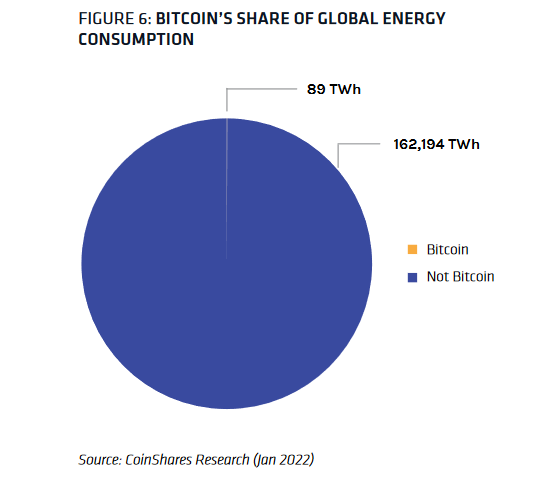[ad_1]

The Bitcoin (BTC) mining network contributed less than 0.08% to the world’s total carbon dioxide (CO2) emissions, according to digital asset investing firm CoinShares. Data obtained by the company suggests that BTC mining is responsible for a marginal share of the global CO2 emissions, in particular when compared with the variety of services that are facilitated by the use of the cryptocurrency.
The Bitcoin mining network produced some 36m tons of CO2 in 2020 and 41m tons last year. The study claims that, owing to flare mitigation, an estimated 2.1m tons of CO2 equivalents could be removed from the market, bringing BTC mining’s total net emissions to the level of some 39m tons per year.

However, even at this point, the BTC mining network generates an insignificant share of total emissions, which amounts to less than 0.08% of the total, according to CoinShares.
“As a frame of reference, countries with large industrial bases such as the United States and China emitted 5,830 Mt and 11,580 Mt CO2e in 2016, respectively,” the report said.
Moreover, the carbon footprint of BTC mining can hardly match that of a number of traditional industries which are responsible for significantly higher CO2 emissions, as demonstrated by CoinShares’ figures.
“Estimates of the emissions caused by minting and printing fiat currencies come in around 8 Mt per year and the gold industry is estimated to generate between 100 and 145 Mt of CO2 emissions annually,” according to the study.
At an annual energy consumption of 89 TWh, BTC mining uses about 0.05% of the total energy consumed across the world, CoinShares said.
At the time of writing the report, they said, the network’s electricity generation mix was more balanced than ever in the time “since anyone attempted to quantify it.” The company estimated that, as of December 2021, the relative contributions of coal, gas, hydro, nuclear, and wind stood at 35%, 24%, 21%, 11%, and 4%, respectively. The remaining generation of 5% is a mixture of small amounts of oil, solar, and other, mainly geothermal renewables.
By the decade of 2040 – so in just 20 years – more than 99% of all BTC will have been minted, said the report, and minting is done, the vast majority of the energy need will result directly from market demand for BTC transaction settlement through transaction fees offered by users to miners.
Given that “Bitcoin will be 100% renewable as soon as our electricity generation is 100% renewable,” the focus should be on building renewable power generation, instead of on “stifling” monetary technology development.
The emission costs of Bitcoin – when analyzed over the long term and in proper context – are “dwarfed by its benefits,” argues the company, stating:
“At 0.08 % of global CO2 emissions, removing the entire mining network from global demand—and thereby depriving hundreds of millions of people of their only hope for a fair and accessible form of money—would not amount to anything more than a rounding error.”
The report argues that Bitcoin provides a global, free, censorship-resistant, and debasement-protected monetary network for the whole world, which also preserves human rights.
“Within that context, we believe the small addition to global emissions is absolutely worth the cost, and clearly, so do the several hundred million global Bitcoin users who are all voluntarily sharing the energy costs of the mining network, while foregoing alternative consumption,” CoinShares said.
The study’s findings are in line with a recent statement by MicroStrategy CEO Michael Saylor who argued that the total use of energy for BTC mining was “inconsequential.” Speaking at a quarterly briefing by the Bitcoin Mining Council (BMC), Saylor said that the amount of energy Bitcoin is using makes up no more than “a rounding error” in other major industries, and is “negligible” when compared to total world energy usage.
Per data compiled by the BMC last month, global BTC mining consumes 3.2% of the electrical system energy wasted or lost in the US in the space of a year. The organization also claims that BTC mining energy use is 0.142% when compared to the world’s total energy, while close to 59% of global BTC miners now use sustainable power.
____
Learn more:
– Bitcoin & Crypto Mining in 2022: New Locations, Technologies, and Bigger Players
– Analysts See Slower Bitcoin Hashrate Growth in 2022 Amid Market Correction
– A Closer Look at the Environmental Impact of Bitcoin Mining
– Bitcoin & Crypto Miners Must Take Note as Davos Chiefs Say ‘Nobody Can Hide’ from ESG Standards
– Bitcoin Mining Energy Use ‘Inconsequential,’ ‘Rapidly Becoming More Efficient’ – Saylor
– How Bitcoin Mining Might Help Nations With Domestic Energy Production
– Dominated by Institutions, Bitcoin Mining is also Possible from Home
[ad_2]
cryptonews.com




